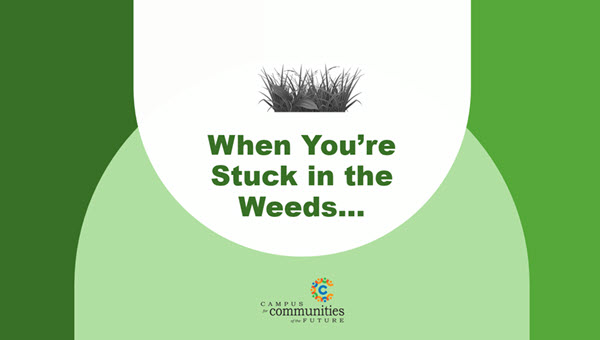When You’re Stuck in the Weeds

A long time ago, I worked for a guy who was something of a leadership junkie. Every time he returned from a conference or read a new book, we would brace ourselves for what we referred to as his new flavour-of-the-week management theory.
Inspired by his enthusiasm, we adopted a gung-ho approach to implementing new thinking or strategy.
Without fail, it would ultimately die a slow death, and we would then hold our collective breath, waiting for the next great new idea to be sent our way.
In hindsight, it has become more apparent that when my old boss attempted change, it was about something other than strategy, structure, culture, or the system. His desire, and ultimately that of all leaders, was more about changing people’s behaviour.
It follows that if we can figure out how to change behaviour, chances are we will always be able to implement the change needed to achieve our dreams and desires – lose weight, quit smoking, go back to school, give back to others, or get fit. Not only that, but changing behaviour would also be necessary for all organizations and businesses competing in an increasingly complex and rapidly changing environment or in making our vision of safe, healthy, and vibrant communities a reality.
Given that it’s January and many are thinking about the upcoming year, my boss of long ago might appreciate knowing I found one book that greatly impacted my approach to change and how it can best be supported. It’s not a new one, but for me, it was a jaw-dropper: ‘Change or Die’ by Alan Deutschman.
So, what sets Deutschman’s theory of change apart from other approaches?
It began for him as an article he wrote for a magazine prompted by statistics from the American healthcare industry.
He learned that despite conventional wisdom suggesting people change during a crisis – they typically don’t.
He cites the example of cardiac patients for whom it was indeed a case of ‘change or die.’ In their case, it meant that even after critical and expensive bypass surgery, they would still need to change their diet, decrease stress, and increase exercise.
Even knowing they were facing the ultimate crisis and could die if they didn’t change, an astonishing nine out of ten could not.
Indeed, it is estimated that over 25% of all healthcare costs could be reduced or even eliminated if we could figure out how to get people to implement lifestyle changes.
Learning that, Deutschman instead focused on what he could learn from the cardiac patients and others in different situations who had been able to change.
This unique approach greatly impacted our participatory action research at the grassroots level of communities. In many cases, it reinforced our learnings and helped us realize we had intuitively been focusing on those who had been successful in facilitating change and growth.
Deutschman learned, and went on to write more about in his book, that the secret of those who were able to change their behaviour amounted to three keys - they identified with a person, organization, or community. They got to practice that new behaviour repeatedly, thus learning to think as if they had already changed. Doing that allowed them to reframe their experiences.
The first key is the importance of an emotional relationship with a person, organization, or community that inspires and restores hope. It is not willpower that gets one unstuck; it is a relationship that makes you believe you can, and are expected, to change.
In essence, they believe you can change.
Additionally, those involved in this relationship sell you on themselves as your partners, mentors, role models, or source of new knowledge and the specific methods or strategies that they, and now you, need to employ. Still not convinced? Just think about any time you’ve changed significantly in the past. Chances are there has been a good teacher, coach, mentor, or group jumpstarting your change by providing guidance, encouragement, and direction to show you the way.
The second key is that this new relationship, which is much more about heart and emotion than facts, helps you learn, practice, and master the latest skills, knowledge, and attitudes you need. This speaks to the importance of training and coaching to ensure these new behaviours become automatic.
The third key is about reframing.
Your new relationship helps you learn ways to think about your situation, life, organization, and community. Ultimately, you view the situation in a new way that would have been foreign to you before you changed.
So, the three keys to change are three new R’s that are well worth learning: relate, repeat, and reframe. All in all, what this could mean for your resolutions, those of your organization or business, or your community this year is new hope, new skills, and a new way of thinking that will lift you out of the weeds.
Next entry: Doin’ What Comes Naturally?
Previous entry: There’s Always Chocolate!

 Brenda Herchmer is the owner of Grassroots Enterprises, a community development consulting company.
Brenda Herchmer is the owner of Grassroots Enterprises, a community development consulting company.